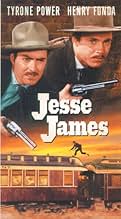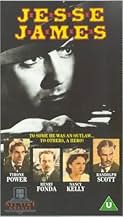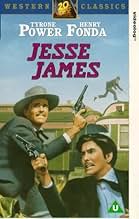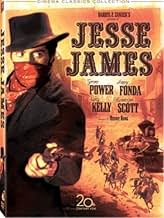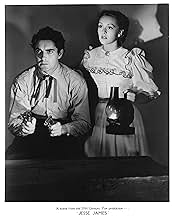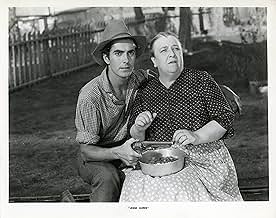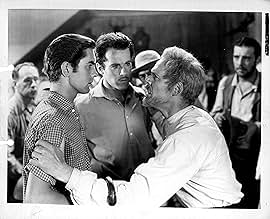ÉVALUATION IMDb
7,0/10
5,2 k
MA NOTE
Ajouter une intrigue dans votre langueAfter railroad agents forcibly evict the James family from their family farm, Jesse and Frank turn to banditry for revenge.After railroad agents forcibly evict the James family from their family farm, Jesse and Frank turn to banditry for revenge.After railroad agents forcibly evict the James family from their family farm, Jesse and Frank turn to banditry for revenge.
Johnny Russell
- Jesse James Jr.
- (as John Russell)
Avis en vedette
With Ty Power and Hank Fonda in the saddle, there was no way this version of the James Brothers legend was going to paint them as bad guys.
Less so since the courtly southerner Nunnally Johnson wrote and produced the yarn. In reality the James boys took to knocking off banks and trains after being at a loose end following Missouri's joining the losing side in the War Between the States. This was too painful a scab to pick in the Thirties, so Johnson gives the Jameses a more palatable enemy than Abe Lincoln: big bad railroad barons upsetting their ma. And he paints his outlaws with a populist tint, to please New Deal Democrats as well as Dixiecrats who knew the real backstory.
However, the broad outlines of their rise and fall are intact. We see a gradual slide into semi-chivalrous villainy (they didn't rob train passengers, only mails), a 'Liberty Valance'-like exploitation of their coups by political orators and editors, Jesse's becoming consumed by his own legend, and the final botched bank job at Northfield, Minnesota. That leads to a panicky flight and an attempt to live semi-respectably under pseudonyms, followed by Bob Ford's betrayal as Jesse turns art curator.
The film is pleasingly quiet between action set pieces, free of the obtrusive music that was often the curse of Hollywood soundtracks and laced with good lines from Johnson's florid pen. And above all, surrounded by good character actors, we have two rising Zanuck stars tussling enjoyably for mastery, both in the plot and career-wise.
Henry King had become Power's preferred handler ('In Old Chicago' the previous year had been a wow) and both men evidently relish the challenge of tweaking his 'nice bank teller' image a little. Swarthy and bearded betimes, barking out orders to older subordinates, Power does fine. Fonda's grand remonstrance, when he tells Junior that he's turning into a suicidal psycho, is ably played and paced. The soft early tripack Technicolor looks sweet both outdoors-- Ford was getting similar results in 'Drums Along the Mohawk'-- and in candle-lit interiors.
Also noteworthy is Jesse's respectful, confiding relationship with his black ex-slave Pinky (Ernest Whitman) when he decides not to pursue Frank. Black maids could sass their mistresses in crazy comedies, but this quality of understanding between men of different colours was unusual in early-talkie Hollywood.
'Jesse James' was released in Hollywood's peak year, 1939. It's understandable that it was overlooked. But when we've done finger-wagging at the cruelty to horses which led the American Humane Association to demand supervisory privileges over stampedes-- and the cruelty to female Central Casting members which allowed Power to father a child on one-- we can still appreciate a good, workmanlike travesty of outlaw history. As a distortion of the James-Younger saga it has not been surpassed.
Less so since the courtly southerner Nunnally Johnson wrote and produced the yarn. In reality the James boys took to knocking off banks and trains after being at a loose end following Missouri's joining the losing side in the War Between the States. This was too painful a scab to pick in the Thirties, so Johnson gives the Jameses a more palatable enemy than Abe Lincoln: big bad railroad barons upsetting their ma. And he paints his outlaws with a populist tint, to please New Deal Democrats as well as Dixiecrats who knew the real backstory.
However, the broad outlines of their rise and fall are intact. We see a gradual slide into semi-chivalrous villainy (they didn't rob train passengers, only mails), a 'Liberty Valance'-like exploitation of their coups by political orators and editors, Jesse's becoming consumed by his own legend, and the final botched bank job at Northfield, Minnesota. That leads to a panicky flight and an attempt to live semi-respectably under pseudonyms, followed by Bob Ford's betrayal as Jesse turns art curator.
The film is pleasingly quiet between action set pieces, free of the obtrusive music that was often the curse of Hollywood soundtracks and laced with good lines from Johnson's florid pen. And above all, surrounded by good character actors, we have two rising Zanuck stars tussling enjoyably for mastery, both in the plot and career-wise.
Henry King had become Power's preferred handler ('In Old Chicago' the previous year had been a wow) and both men evidently relish the challenge of tweaking his 'nice bank teller' image a little. Swarthy and bearded betimes, barking out orders to older subordinates, Power does fine. Fonda's grand remonstrance, when he tells Junior that he's turning into a suicidal psycho, is ably played and paced. The soft early tripack Technicolor looks sweet both outdoors-- Ford was getting similar results in 'Drums Along the Mohawk'-- and in candle-lit interiors.
Also noteworthy is Jesse's respectful, confiding relationship with his black ex-slave Pinky (Ernest Whitman) when he decides not to pursue Frank. Black maids could sass their mistresses in crazy comedies, but this quality of understanding between men of different colours was unusual in early-talkie Hollywood.
'Jesse James' was released in Hollywood's peak year, 1939. It's understandable that it was overlooked. But when we've done finger-wagging at the cruelty to horses which led the American Humane Association to demand supervisory privileges over stampedes-- and the cruelty to female Central Casting members which allowed Power to father a child on one-- we can still appreciate a good, workmanlike travesty of outlaw history. As a distortion of the James-Younger saga it has not been surpassed.
A real life legend of the Old West comes to life in this 1939 film, which may not be historically accurate or honest enough for purists, but nevertheless tells a good story while leaving any moral judgments up to the audience. `Jesse James,' directed by Henry King, stars Tyrone Power as the man heralded by some as the Robin Hood of cowboys. Whether or not he was actually a hero is debatable, and what this movie does is supply the motivation for the wrong-doing on Jesse's part-- at least up to a point. At the time this film was made, it was necessary for the filmmaker to present a story like this in a way that reflected a reckoning of sorts for a character engaged in any form of moral turpitude; and this film is no exception. But in this case, it's done with subtlety, and in a way that still allows the viewer's sympathies to be with the protagonist, regardless of his crimes.
At the heart of the matter is basically another version of the oft-told David and Goliath tale. In this story, Goliath is the railroad, expanding ever-westward and growing bigger and stronger by the day. When they encounter the farm on which Jesse, his brother, Frank (Henry Fonda) and their mother (Jane Darwell) reside and make their living, the railroad does what any self-respecting conglomerate would do-- they take it, pay the owners a pittance and lay their rail without giving it another thought. Only this time, the railroad messed with the wrong people. Not one to take it lying down, Jesse forms a gang-- which includes Frank-- and strikes back in the only way he knows how: By robbing the trains. And, just as Bonnie and Clyde would become, in a sense, local heroes a few years later, many began looking up to James as something of a redeemer; the man who stood up for all the others who were either unwilling or unable to do it for themselves after being wronged, as well, by the ruthless machinery of progress.
Power gives an outstanding performance as Jesse James, to whom he brings an intensity that seethes beneath his rugged good looks and determined attitude. Like Beatty did with Clyde, Power makes Jesse an outlaw you can't help but like, and actually admire. Because the James Power presents is nothing more nor less than a good man seeking reparation for the injury visited not only upon himself, but upon his family, to whom he feels justice is now due. It's a very credible and believable portrayal, though under close scrutiny his Jesse may come across as somewhat idealistically unflawed. Then again, within the time frame of this story, we are seeing a man adamant and single-minded of purpose, and the depth Power brings to the character more than accounts for what may be construed as a flawless nature.
As Frank James, Henry Fonda presents a man perhaps more laid-back than his brother, but every bit as volatile and adamant in his quest for justice. There's a coolness in his eyes and in his manner that belies the tenacity of his character. Fonda conveys the sense that Frank is a lion; he's no trouble without provocation, but once aroused he will demand satisfaction and stay with the scent until he has it. And it's that sense of dogged determination that Fonda and Power bring to their respective characters that makes them so engaging and accessible. Goliath is the real bad guy here, and you want to see him fall; and these are the guys you want to see bring him down.
In a supporting role, John Carradine gives a noteworthy performance as Jesse's own personal Judas, Bob Ford, a man who made history by demonstrating that there is, indeed, no honor among thieves. Carradine brings Ford to life in a sly and sinister way that leaves no doubt as to who the real villain of the story is.
The supporting cast includes Nancy Kelly (Zee), Randolph Scott (Will), Slim Summerville (Jailer), Brian Donlevy (Barshee), Donald Meek (McCoy), Charles Tannen (Charlie Ford), Claire Du Brey (Mrs. Ford) and Henry Hull, in an energetic and memorable performance as Major Rufus Cobb. Compared to many of the westerns made in the past couple of decades or so, this film is rather antiseptic in it's presentation; that is to say it lacks the graphic visuals of say, `The Wild Bunch' or Eastwood's `Unforgiven.' But `Jesse James' is satisfying entertainment that doesn't require or rely upon shocking realism to tell the story, but rather the talent and finesse of a great cast and a savvy director. It's a movie that will keep you involved, and Power and Fonda make it an especially enriching cinematic experience. In a very classic sense, this is the magic of the movies. I rate this one 8/10.
At the heart of the matter is basically another version of the oft-told David and Goliath tale. In this story, Goliath is the railroad, expanding ever-westward and growing bigger and stronger by the day. When they encounter the farm on which Jesse, his brother, Frank (Henry Fonda) and their mother (Jane Darwell) reside and make their living, the railroad does what any self-respecting conglomerate would do-- they take it, pay the owners a pittance and lay their rail without giving it another thought. Only this time, the railroad messed with the wrong people. Not one to take it lying down, Jesse forms a gang-- which includes Frank-- and strikes back in the only way he knows how: By robbing the trains. And, just as Bonnie and Clyde would become, in a sense, local heroes a few years later, many began looking up to James as something of a redeemer; the man who stood up for all the others who were either unwilling or unable to do it for themselves after being wronged, as well, by the ruthless machinery of progress.
Power gives an outstanding performance as Jesse James, to whom he brings an intensity that seethes beneath his rugged good looks and determined attitude. Like Beatty did with Clyde, Power makes Jesse an outlaw you can't help but like, and actually admire. Because the James Power presents is nothing more nor less than a good man seeking reparation for the injury visited not only upon himself, but upon his family, to whom he feels justice is now due. It's a very credible and believable portrayal, though under close scrutiny his Jesse may come across as somewhat idealistically unflawed. Then again, within the time frame of this story, we are seeing a man adamant and single-minded of purpose, and the depth Power brings to the character more than accounts for what may be construed as a flawless nature.
As Frank James, Henry Fonda presents a man perhaps more laid-back than his brother, but every bit as volatile and adamant in his quest for justice. There's a coolness in his eyes and in his manner that belies the tenacity of his character. Fonda conveys the sense that Frank is a lion; he's no trouble without provocation, but once aroused he will demand satisfaction and stay with the scent until he has it. And it's that sense of dogged determination that Fonda and Power bring to their respective characters that makes them so engaging and accessible. Goliath is the real bad guy here, and you want to see him fall; and these are the guys you want to see bring him down.
In a supporting role, John Carradine gives a noteworthy performance as Jesse's own personal Judas, Bob Ford, a man who made history by demonstrating that there is, indeed, no honor among thieves. Carradine brings Ford to life in a sly and sinister way that leaves no doubt as to who the real villain of the story is.
The supporting cast includes Nancy Kelly (Zee), Randolph Scott (Will), Slim Summerville (Jailer), Brian Donlevy (Barshee), Donald Meek (McCoy), Charles Tannen (Charlie Ford), Claire Du Brey (Mrs. Ford) and Henry Hull, in an energetic and memorable performance as Major Rufus Cobb. Compared to many of the westerns made in the past couple of decades or so, this film is rather antiseptic in it's presentation; that is to say it lacks the graphic visuals of say, `The Wild Bunch' or Eastwood's `Unforgiven.' But `Jesse James' is satisfying entertainment that doesn't require or rely upon shocking realism to tell the story, but rather the talent and finesse of a great cast and a savvy director. It's a movie that will keep you involved, and Power and Fonda make it an especially enriching cinematic experience. In a very classic sense, this is the magic of the movies. I rate this one 8/10.
This film's beauty is that it is so simple. This is by far the best version of the Jesse James story - there is not a sign of formalism as is regularly seen in later westerns, especially modern ones. When you are able to tell a story the way Henry King does, simply and clearly, then you begin to discover many other stories inside the main one. And then you know you have the original, the prototype.
Of all the films Hollywood made during the golden years, my least favorite were ones that played very fast and loose with the facts about the Old West. And, of all the Westerns, those about Jesse James as well as the gunfight at the OK Corral are the worst. Think of it from my point of view. I am an American history teacher and for some bizarre reason, I like my historical films to actually bear some semblance to what actually occurred!!
JESSE JAMES, like all these other films, is a historical nightmare from start to finish. The life of this evil killer and thief is practically impossible to discern in this silly but entertaining film from 20th Century-Fox Studios. Instead of a bad man, according to the film, he is unfairly pushed to a life of crime by an evil railroad AND he and his brother, Frank, are good boys at heart!! With such stupid revisionism, we should soon expect to see films where Hitler, Lee Harvey Oswald and Jeffrey Dahmer are heroes!! There are tons more mistakes about the characters--but simply too many to bother mentioning. In fact, what is NOT wrong would be quicker and easier to discuss!! Additionally, there are just every cliché known to Westerns, such as the shootout ("count three and fire"), Frank giving the town an ultimatum to give him back Jesse by midnight "or else", happy and intensely loyal Black servants, the Robin Hood-like quality of the gang (though at least they showed how eventually he became more of a hardened criminal), the death of Frank and Jesse's momma pushing them to crime, Henry Hull's character from start to finish as well as his comments like "Jesse played fair" and "he was one of the gol-dangedest gol-darnestest buckaroos"!
As for the non-historical aspects of the film, there is a lot to like. The film is shot in glorious Technicolor and the camera work is incredible. I especially loved the extremely difficult shot of the nighttime raid on the train--the moving external shot was NOT an easy thing to do and it looked great. Additionally, being an A-picture from the studio, the cast was spectacular--Tyrone Power (Jesse), Henry Fonda (Frank), Henry Hull (playing a role much like you might expect Walter Brennan to usually play), Randolph Scott, Jane Darwell, Donald Meek and Brian Donlevy make for an excellent cast. And, I must admit the film was fun to watch if you could care less about the facts and just want to be entertained. Unfortunately, for folks like me, it's a chore to watch even a well-made film if it's so historically inaccurate.
By the way, it should also be mentioned that according to the IMDb trivia section, this film should be remembered for its total disregard for the welfare of the horses during filming. In exciting scenes, horses actually died to make the shots look good and although I am NOT a bleeding-heart, I just can't help but be appalled with this disregard for the animals. Not surprisingly, this film led to changes in the industry to protect animals in future films.
JESSE JAMES, like all these other films, is a historical nightmare from start to finish. The life of this evil killer and thief is practically impossible to discern in this silly but entertaining film from 20th Century-Fox Studios. Instead of a bad man, according to the film, he is unfairly pushed to a life of crime by an evil railroad AND he and his brother, Frank, are good boys at heart!! With such stupid revisionism, we should soon expect to see films where Hitler, Lee Harvey Oswald and Jeffrey Dahmer are heroes!! There are tons more mistakes about the characters--but simply too many to bother mentioning. In fact, what is NOT wrong would be quicker and easier to discuss!! Additionally, there are just every cliché known to Westerns, such as the shootout ("count three and fire"), Frank giving the town an ultimatum to give him back Jesse by midnight "or else", happy and intensely loyal Black servants, the Robin Hood-like quality of the gang (though at least they showed how eventually he became more of a hardened criminal), the death of Frank and Jesse's momma pushing them to crime, Henry Hull's character from start to finish as well as his comments like "Jesse played fair" and "he was one of the gol-dangedest gol-darnestest buckaroos"!
As for the non-historical aspects of the film, there is a lot to like. The film is shot in glorious Technicolor and the camera work is incredible. I especially loved the extremely difficult shot of the nighttime raid on the train--the moving external shot was NOT an easy thing to do and it looked great. Additionally, being an A-picture from the studio, the cast was spectacular--Tyrone Power (Jesse), Henry Fonda (Frank), Henry Hull (playing a role much like you might expect Walter Brennan to usually play), Randolph Scott, Jane Darwell, Donald Meek and Brian Donlevy make for an excellent cast. And, I must admit the film was fun to watch if you could care less about the facts and just want to be entertained. Unfortunately, for folks like me, it's a chore to watch even a well-made film if it's so historically inaccurate.
By the way, it should also be mentioned that according to the IMDb trivia section, this film should be remembered for its total disregard for the welfare of the horses during filming. In exciting scenes, horses actually died to make the shots look good and although I am NOT a bleeding-heart, I just can't help but be appalled with this disregard for the animals. Not surprisingly, this film led to changes in the industry to protect animals in future films.
The first western shot in color focuses more on mythology than facts of this famous outlaw. Tyrone Power in the lead role shows acting abilities not seen in his previous movies,and delivers an intense portrayal of Jesse James. Underplaying his part as Frank James to great effect, Henry Fonda steals the movie.Although a supporting part he's missed in the scenes his not in. Randolph Scott as the marshal delivers one of his best performances. Nancy Kelly makes a beautiful love interest for Power. Henry Hull's crusading editor is fun to watch. The movie is wonderful to look at and one of the great westerns.I hope this classic western will be out on DVD soon.
Le saviez-vous
- AnecdotesAfter the two horses that were blindfolded and forced to go over a cliff were killed, a new rule was enforced and later endorsed by The Humane Society of America in which strict standards were created to protect animals. Productions that met the standards of the Humane Society were allowed to add "No Animals Were Harmed or Injured in the Production of this Film" to the end credits. Eventually all the studios agreed that films involving any animals must have present a representative of The Humane Society to ensure that all animals are treated humanely and given a safe environment in which to work.
- GaffesThe movie shows a bomb killing Frank and Jesse's mother. In reality, the bomb thrown through the window by the Pinkerton agents killed their little brother and seriously wounded their mother, who survived although she lost an arm in the explosion.
- Citations
[last lines]
[about Jesse James]
Major Rufus Cobb: He was one of the doggonedest, gawl-dingedest, dad-blamedest buckaroos that ever rode across these United States of America!
- Générique farfeluOpening credits prologue: After the tragic war between the states, America turned to the winning of the West. The symbol of this era was the building of the trans-continental railroads.
The advance of the railroads was, in some cases, predatory and unscrupulous. Whole communities found themselves victimized by an ever-growing ogre - the Iron Horse.
It was this uncertain and lawless age that gave to the world, for good or ill, its most famous outlaws, the brothers Frank and Jesse James.
- Autres versionsAll UK versions were cut by 13 secs by the BBFC to remove footage of horse-falls including the controversial scene of a horse fatally falling from a cliff.
- ConnexionsEdited into Myra Breckinridge (1970)
- Bandes originalesThe Battle Cry of Freedom
(1862) (uncredited)
Written by George Frederick Root
Played by the band at the railroad station
Meilleurs choix
Connectez-vous pour évaluer et surveiller les recommandations personnalisées
- How long is Jesse James?Propulsé par Alexa
Détails
- Date de sortie
- Pays d’origine
- Langue
- Aussi connu sous le nom de
- Darryl F. Zanuck's Production of Jesse James
- Lieux de tournage
- société de production
- Consultez plus de crédits d'entreprise sur IMDbPro
Box-office
- Budget
- 1 600 000 $ US (estimation)
- Brut – à l'échelle mondiale
- 3 444 $ US
- Durée
- 1h 46m(106 min)
- Couleur
- Rapport de forme
- 1.37 : 1
Contribuer à cette page
Suggérer une modification ou ajouter du contenu manquant



